Menu
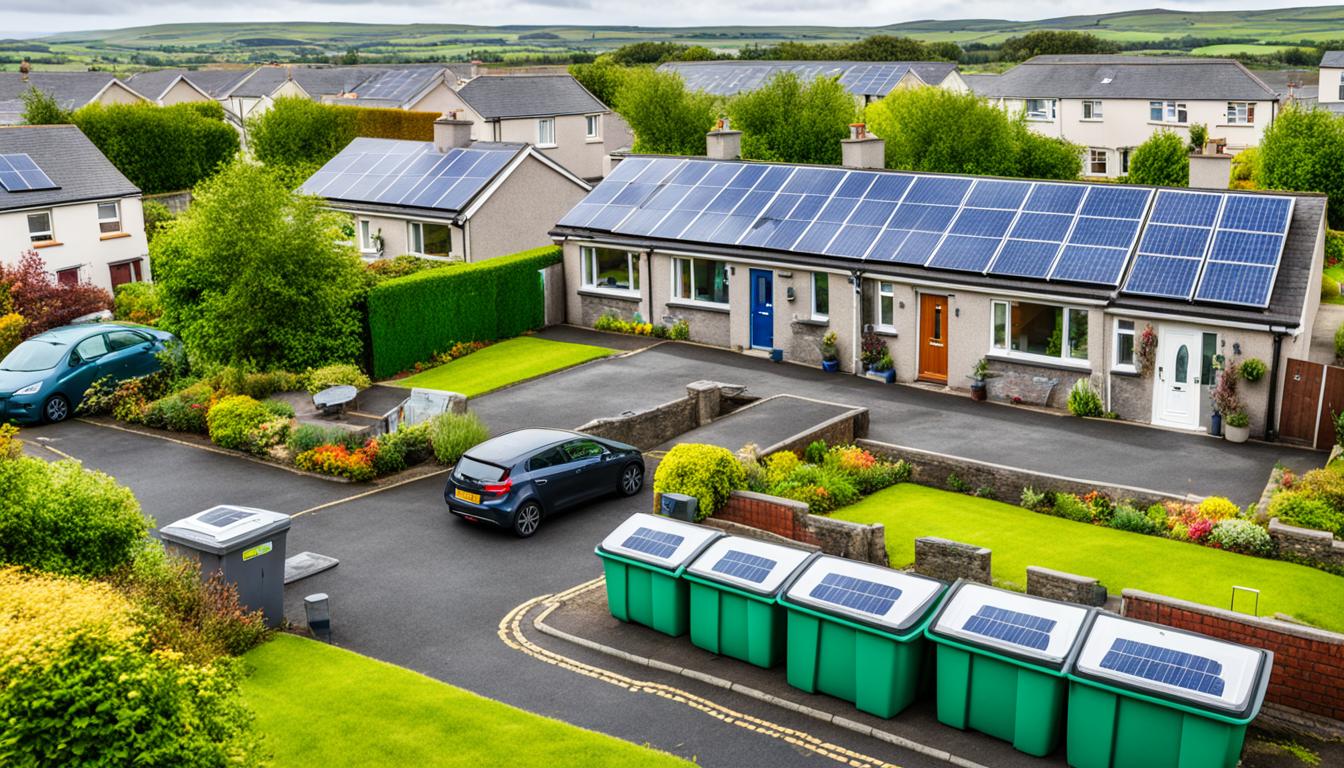
Did you know that over two-thirds of the waste in general bins could have been recycled or composted? This issue shows there’s a big challenge in Ireland’s waste handling.
The government recently announced key changes. They aim to make waste management more sustainable. This is especially true for businesses. The concern is the big impact of wrong waste disposal on our environment. These measures push for us all to be more green.
These regulations look to solve the problem of waste mismanagement. It’s an issue that if left alone, could badly affect our planet. Their goal is to decrease the recyclable and organic waste in regular bins. They aim to encourage both businesses and homes to dispose of waste the right way.
New waste management rules in Ireland are a big step towards better waste handling. They aim to change how we throw away waste at homes and businesses. This move is vital for meeting Ireland’s recycling targets and following the goals of a circular economy defined by Europe.
These rules include tight *waste recycling legislation in Ireland*. The 2007 Waste Management (Collection Permit) Regulations say all waste collection companies must have a permit. This makes sure waste collection is done properly and checked regularly.
A Black Bin Levy of €10 per tonne started on September 1 to cut down trash that goes to incineration. This levy aims to boost recycling. Also, Pay-By-Weight Schemes now charge homes based on how heavy their waste is. This helps everyone take responsibility and encourages recycling.
Not following the *hazardous waste regulations in Ireland* can cost you a lot of money and put you in legal trouble. It’s super important for homes and businesses to follow the rules. By 2030, Ireland wants to cut down on landfill waste by 90%. This is a tough goal that will require big improvements in waste management.
Ireland also offers rewards to help new ideas in recycling and organic waste. This shows how serious the country is about making sure we protect our environment. All these steps make sure Ireland’s waste practices support a healthy future.
These comprehensive regulations aim to make waste management better. They ensure Ireland stays clean and green by closely watching over waste collection and processing.
Ireland has made big changes to its waste management. This is to make things more sustainable. The Environmental Protection Agency found that too much waste was going in normal bins. So, new ways of collecting waste and stricter rules were needed.
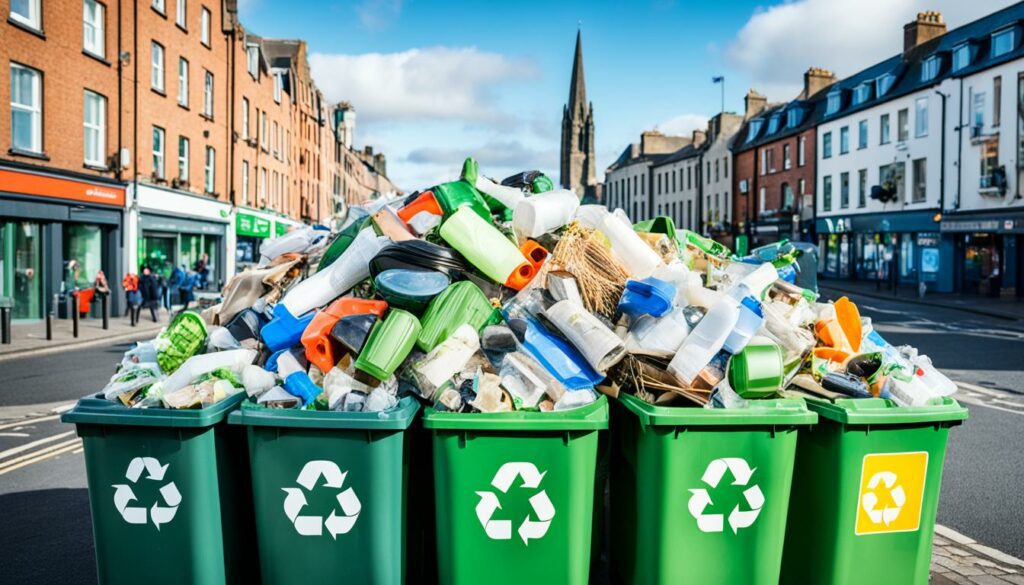
New waste collection schemes are now in place in Ireland. This is a key move to follow waste management rules better. Micheál Lehane from the EPA stressed the importance of adding organic waste bins quickly. He also talked about rules for businesses. These new schemes are also helping to tidy up the waste collection business. The number of official waste collectors dropped to 2,021 in 2020 from over 3,000 in 2010.
From 1 July 2023, there are tougher waste rules for shops and other businesses in Ireland. They must follow these new rules carefully. Local councils are working hard on this, with over 140,000 waste checks and more than 17,900 penalties in 2021.
Not keeping up with the rules can lead to big fines for businesses. Even though Ireland is good at meeting EU waste goals, its waste sector ranked second for not following the rules in 2022. Only the Food & Drink sector did worse.
| Indicator | Figures |
|---|---|
| Authorized Waste Collectors (2010) | 3,000+ |
| Authorized Waste Collectors (2020) | 2,021 |
| Waste-Related Inspections (2021) | 140,000 |
| Waste and Litter Complaints (2021) | 72,800+ |
| Waste Enforcement Actions (2021) | 17,900+ |
| Waste Prosecutions (2021) | 578+ |
One big issue is Ireland depending on other countries for dealing with waste. This forces Irish businesses to meet high European waste standards. The National Waste Policy 2020-2025 plants to make Ireland follow strict waste rules. This is meant to help move towards a circular economy. It will also reduce risks linked to more waste with a growing population, expected to hit 6.7 million by 2051.
Doing waste segregation well is key for a better environment. Thanks to new rules, everyone in Ireland, including homes and businesses, must do better at sorting their rubbish. This helps recycle more and lowers the rubbish we put in landfills.
Ireland’s homes play a big part in waste. Shockingly, more than two-thirds of what’s in normal waste bins could actually be recycled. A good portion of waste is food (17%) and plastics (17%). Also, 24% of it is stuff that can and should be recycled, like plastics, paper, and metals.
What’s really worrying is that most plastics and a lot of food waste end up in the wrong bins, not the recycling or organic bins.
Companies also need to up their waste game. A whopping 69% of their general waste should actually be recycled or put in organic bins. Food waste alone makes up 30% of what’s thrown out. Plastics are at 15%.
Even more troubling is that 75% of plastics and 70% of commercial food waste go in the wrong bins. This needs to change, to meet Ireland’s big environmental goals.
| Waste Type | Household General Waste (%) | Commercial General Waste (%) |
|---|---|---|
| Food Waste | 17 | 30 |
| Plastics | 17 | 15 |
| Recyclable Materials | 24 | 37 |
Homes and businesses must take their environmental duty seriously. Sorting waste right is not something we can ignore. It helps us throw away less and boosts how much we recycle and use organic waste.
Ireland waste management regulations are changing to focus on the environment. In 2020, the country produced 16.2 million tonnes of waste. This was more than before. It shows how important sustainable practices are.
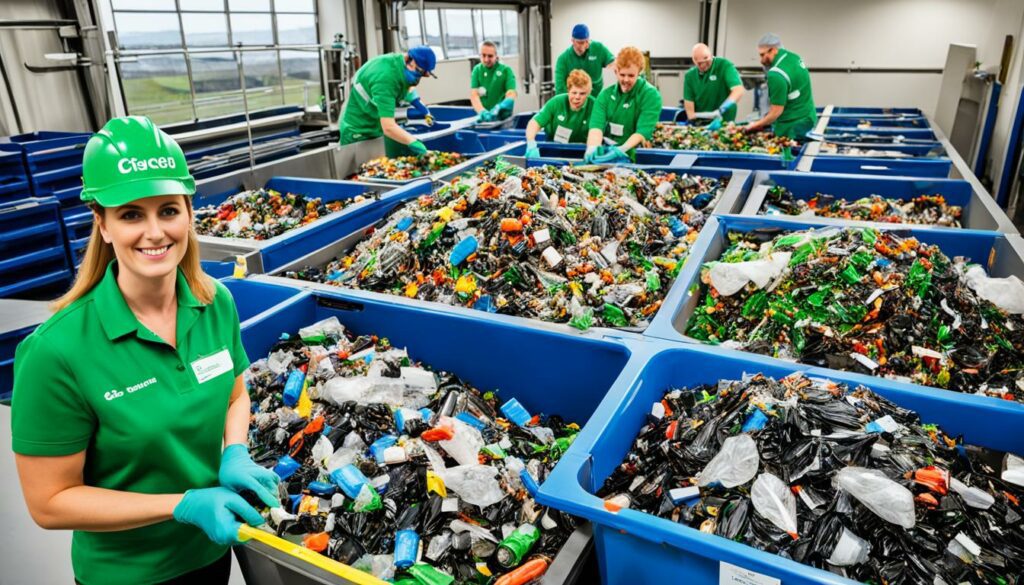
Last year, over 9 million tonnes of construction waste was produced. Alongside this, household waste has grown by 27% in five years to over 400,000 tonnes. These facts highlight the urgent need for better environmental efforts. Even though waste increased by 11%, recycling rates stayed the same. This shows the urgency of new waste rules.
Ireland has improved its recycling of household waste by 11% since 2016. However, it must do more to reach the 2025 EU goal. Laws making sustainable practices a must are helping in this effort.
Poor waste practices, economic activities, and how much we consume are closely tied. Moving towards a circular economy is critical for the future. Ireland’s waste could grow a lot by 2051. This growth could be harmful if not managed well.
The country should lessen sending waste abroad. This change will meet EU and UN goals. With the right steps, waste regulations in Ireland can make a real difference. By passing laws, protecting the environment will be a real action, leading to a greener and cleaner Ireland.
In Ireland, a new rule makes it necessary to have a separate bin for organic waste. This change helps Ireland follow EU rules better. The new law came out on December 22, 2023. It says every home in Ireland must follow it by December 31, 2023. This includes everyone in Ireland. The law also calls for a special bin to be used by most homes. These steps are part of how Ireland wants to manage waste better.
From January 1, 2024, every home in Ireland, apart from those on the islands, must have a special brown bin. These bins will be used for recycling organic waste. They will be provided and collected by special companies. This rule helps keep organic waste away from general waste. If you choose not to use the brown bin, you have to tell the waste collectors. They will keep a record for seven years to make sure everyone follows the rule.
Businesses face similar rules but with a few extra details. They have to provide different bins for mixed waste, recyclables, and food waste. This is in line with EU standards. The companies that collect this waste must charge less for the bio-waste or recyclables. This rule is to encourage businesses to separate waste properly. It’s also now a must for them to keep food waste separate from other waste. The aim is to reduce how much waste goes to landfills and avoid fines.
These new rules show Ireland is taking waste management seriously. Both homes and businesses must play their part. These waste rules are designed to protect the environment.
The Recovery Levy in Ireland helps limit the harm of general waste on the environment. The EPA sets clear deadlines for waste management, pushing for better practices.
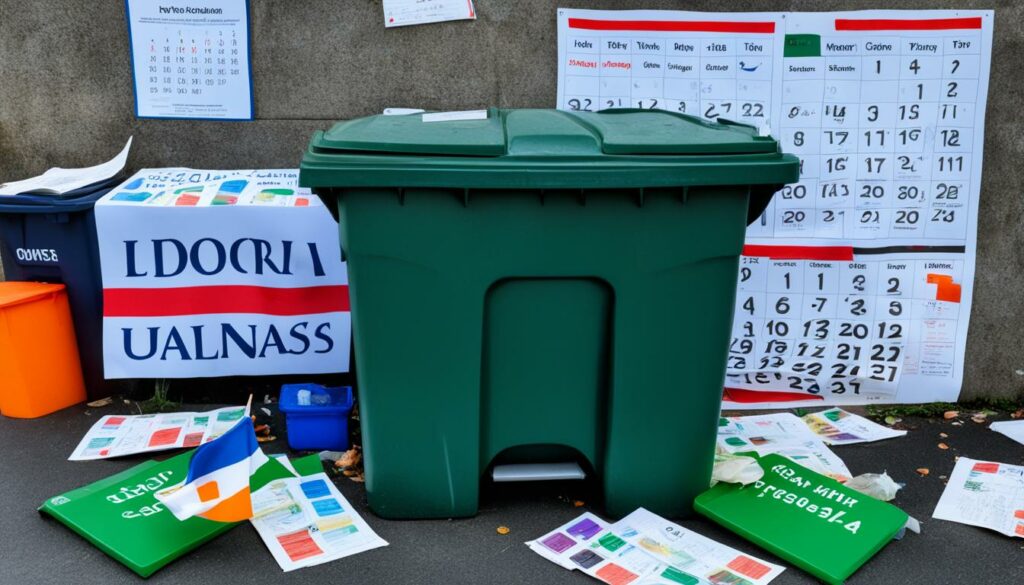
The Recovery Levy is a new tax for not following proper waste rules. It aims to lower the use of landfills and incineration by promoting cleaner waste disposal.
The Waste Framework Directive states that by 2025, at least 55% of municipal waste must be recycled. This goal increases to 65% by 2035. These aims show the push for a cleaner, low-carbon economy under the Europe 2020 Strategy.
The Waste Management Act, 1996, sets out heavy penalties for not following waste rules. This includes big fines, jail time, and cleaning up the mess caused. It shows how serious waste management is taken.
Operators must have permits under the 2007 Waste Management (Collection Permit) Regulations. They must also avoid polluting the environment. Breaching these can lead to big fines and legal action, highlighting the need for strict rule following.
| Regulation | Requirement | Penalty for Non-Compliance |
|---|---|---|
| Waste Framework Directive | 55% recycling by 2025, 65% by 2035 | Financial and legal sanctions |
| Waste Management Act, 1996 | Offense penalties | Fines, imprisonment, clean-up liabilities |
| Waste Management (Collection Permit) Regulations, 2007 | Waste collection permits | Prohibition on pollution, significant fines |
| Waste Management (Shipments of Waste) Regulations 2007 | Notification and financial guarantees | Fines and prosecution |
Adhering to the waste regulations in Ireland is very important. It helps the country move towards sustainable waste management and protects the environment.
The Environmental Protection Agency (EPA) did a waste study in Ireland. It shows that how Ireland manages waste has stayed mostly the same since 2018. In 2021, the country produced 3.17 million tonnes of municipal waste. Only 41% was recycled, which is a bit lower than in 2020. This data makes us question how well Ireland’s waste recycling laws work.
Irish households made up 57% of the 2021 waste. Sadly, a lot of recyclables and leftovers end up in the wrong place. The study found 1.3 million tonnes of waste got recycled. That’s a 41% recycling rate. Also, 487,594 tonnes went through a composting or digestion process. This was a 39% more than the previous year.
Commercial and public services generated 43% of the waste in 2021. Shockingly, about 70% of their waste that went to general bins could have been recycled. This points to a big problem with separating waste types. It shows why businesses need to follow recycling laws better.
In 2021, 1.3 million tonnes of waste were burned for energy. This makes up 42% of all waste management. But, the amount of waste sent to landfills stayed at 16%.
The recycling rates have been at 41% since 2016. However, there’s hope. With new laws, the goal is to get recycling and reusing ready waste up to 65% by 2035. This fits with Ireland’s updated waste laws.
Better waste management in Ireland helps the environment and the economy a lot. By following rules on hazardous waste, Ireland can save money and protect the planet. It also means less harm from dangerous trash and smarter ways to use things again.
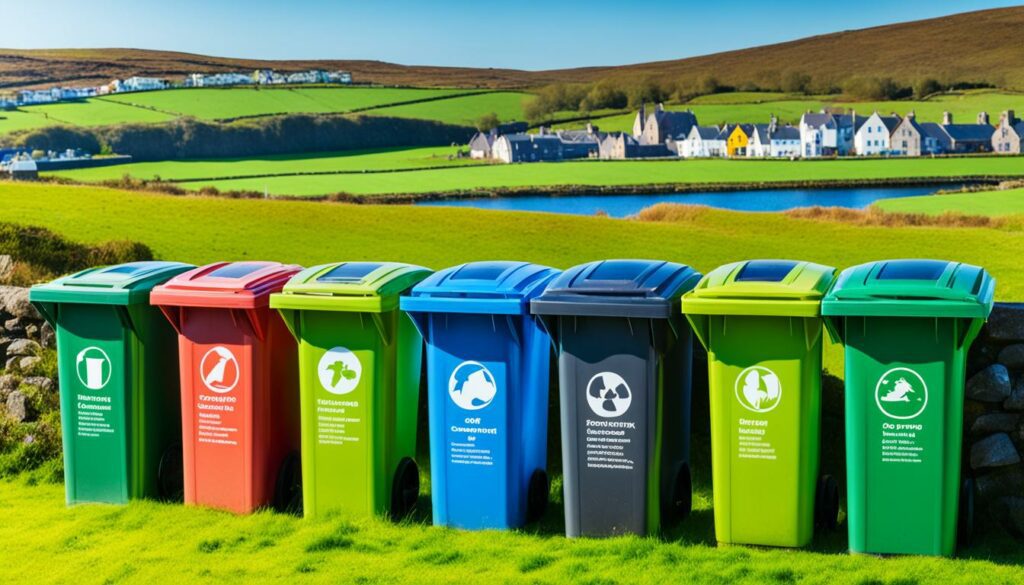
Handling waste better can save our planet from big problems. In 2020, Ireland made 16.2 million tonnes of trash. That’s about 3.25 tonnes for each person. If we work hard to cut down and recycle more, we won’t need to dump as much in the ground. This can make our air and water cleaner.
One big source of trash is from building and breaking down buildings. In 2021, this made up more than 9 million tonnes of trash. But, if we use the 3 Rs – Reduce, Reuse, Recycle – we can make this much less. This is a good start to help our environment.
Doing well with waste means saving money and helping the earth. Using Ireland’s waste tips can lower what families and shops spend on trash. There’s been more household trash over the last 5 years. But sorting it out and recycling can cut costs. This is important because Ireland sends a lot of its trash abroad.
Also, by making a circular economy, we can grow without making more trash. Ireland is working hard to recycle more plastic and other things. This could save us all money. It shows that being good with waste is also good for business.
| Year | Total Waste (Million Tonnes) | Waste Per Person (Tonnes) |
|---|---|---|
| 2012 | 12.7 | 2.77 |
| 2020 | 16.2 | 3.25 |
| Waste Stream | 2021 (Million Tonnes) | Trend |
| Construction and Demolition Waste | 9+ | Largest Waste Stream |
The Environmental Protection Agency (EPA) is key in making sure we follow compliance with waste management rules Ireland. By the end of 2018, Ireland had hit many important goals. The EPA played a big part in this. They worked on different areas such as the Packaging and Packaging Waste Directive, the Landfill Directive, and more.
The EPA mainly works on creating and updating the National Hazardous Waste Management Plan. They also give out Integrated Pollution Prevention and Control (IPPC) licenses and keep a national waste database. This protects water, air, soil, and living things from the risks of waste. It meets the strict rules of the Waste Framework Directive.
The EPA also makes sure rules from the Landfill Directive and the WEEE Directive are followed. The Landfill Directive has very clear rules about waste sites. It stops certain types of waste from going to these sites. This makes our environment healthier. The WEEE Directive helps reduce electronic waste by encouraging recycling and reusing.
Besides, the EPA works hand in hand with local authorities to keep waste rules. Local authorities help with things like allowing commercial waste collection. They also manage moving hazardous waste and give permits for small waste projects. This teamwork ensures waste is handled well.
Below is an in-depth look at what the EPA and local authorities do to make sure we handle waste correctly in Ireland:
| Organisation | Key Responsibilities |
|---|---|
| EPA | National Hazardous Waste Management Plan, IPPC Licenses, National Waste Database, Overseeing Waste Directives Compliance |
| Local Authorities | Authorising Commercial Waste Collection, Monitoring Hazardous Waste Movements, Issuing Waste Permits, Ensuring Waste Collection and Recovery |
The EPA and local authorities work together to improve how we manage waste. They make sure we follow the rules of the EU. This way, they help Ireland meet waste management goals. It builds a future where we care for our planet.
The waste management sector in Ireland is facing big challenges today. It wants to be better for the environment and last long. In 2020, Ireland made about 16.2 million tonnes of waste. This was more than 2012’s 12.7 million tonnes. The growth in waste means new systems are needed to deal with it.
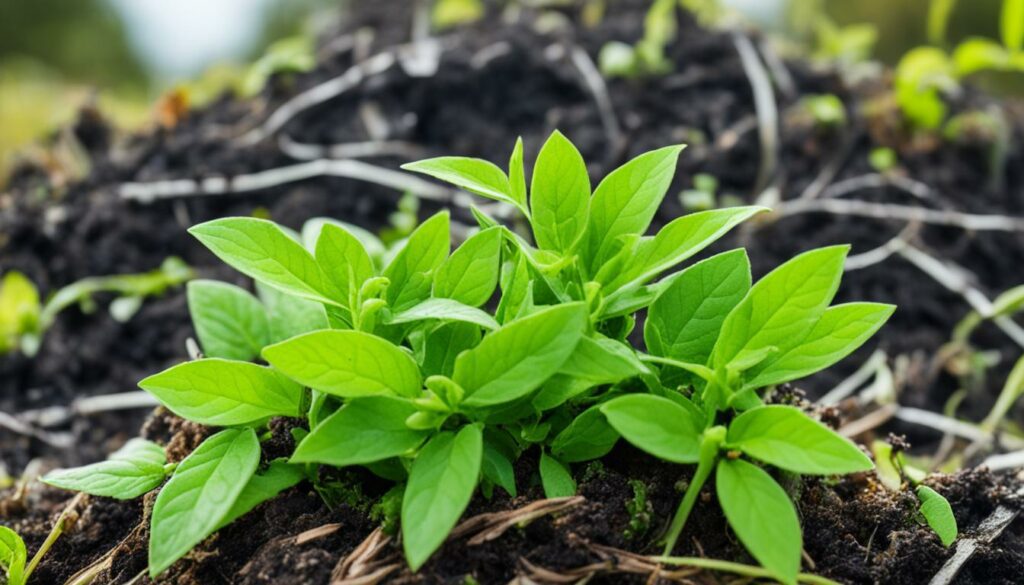
In 2021, over 9 million tonnes came from building and knocking down things. It became the biggest waste stream. This high amount shows we need new and clever ways to handle such a lot of waste. Although more waste is being recycled, the total amount keeps going up. This keeps the recycling rate about the same. It’s clear we need better plans for the environment.
Many kinds of waste in Ireland are sent to other countries for processing. Things like municipal, hazardous, and electronic wastes are often shipped away. But, we need to find better ways to deal with this waste at home instead of sending it away. It will help make things smoother.
By 2025, the EU wants us to recycle even more – 55% of our waste. Right now, Ireland is at 41%. Also, we’re recycling less plastic than we should. We didn’t collect enough WEEE in 2020 either. This all shows the urgent need to change our ways and recycle more.
More waste often means the economy is doing well, and people are using more things. If Ireland aims for a circular economy, which means growing without making more waste, our waste system needs to change. As more people come to Ireland by 2051, we will need a better plan or we risk making too much waste.
To make a real change, everyone needs to work together. Those who are slow to change must pick up the pace. This needs the help of many groups, new ideas, and solid rules. Governments and businesses must join forces. With everyone focusing on smart moves, we can tackle these big issues. Together, we can build a better waste system for Ireland.
The adoption of Ireland’s waste management rules has been a success in many places. Businesses and homes have shown how they follow these rules. They have achieved big wins for the environment and saved money too.
| Company | Cost Savings (€ per annum) | Waste Reduced (tonnes per annum) | CO2 Reduced (tonnes per annum) |
|---|---|---|---|
| ABP Food Group | 150,000 | 330 | 9 |
| CG Power Systems | 180,000 | 678 | |
| Kerry Foods | 30,000 | 112 | |
| Island Seafoods Ltd. | 32,000 | 137.5 | |
| Slaney Foods | 28,000 | 124 |
The work between Scott Tallon Walker Architects and John Sisk & Son stands out. They started waste-saving efforts in the building phase. Their Waste Reduction Toolkit for Design Teams offers help. It covers ways to cut waste, how to buy with less waste in mind, and tips on reusing materials.
In homes, following waste rules has made a big difference. People have learned to sort and recycle well. As a result, less rubbish goes to landfills. They’ve learned from an easy-to-use guide about sorting waste rightly.
These successes show more than just following rules. They show how we can take care of our planet and save money. Businesses and homes working together are making a difference. They are helping Ireland move towards a more sustainable and green future.
Understanding proper waste segregation is crucial in Ireland. It helps us follow the most recent waste disposal laws. Both homes and companies should know what to do to follow these laws. I’ve collected some tips to make the switch to proper waste management easier.
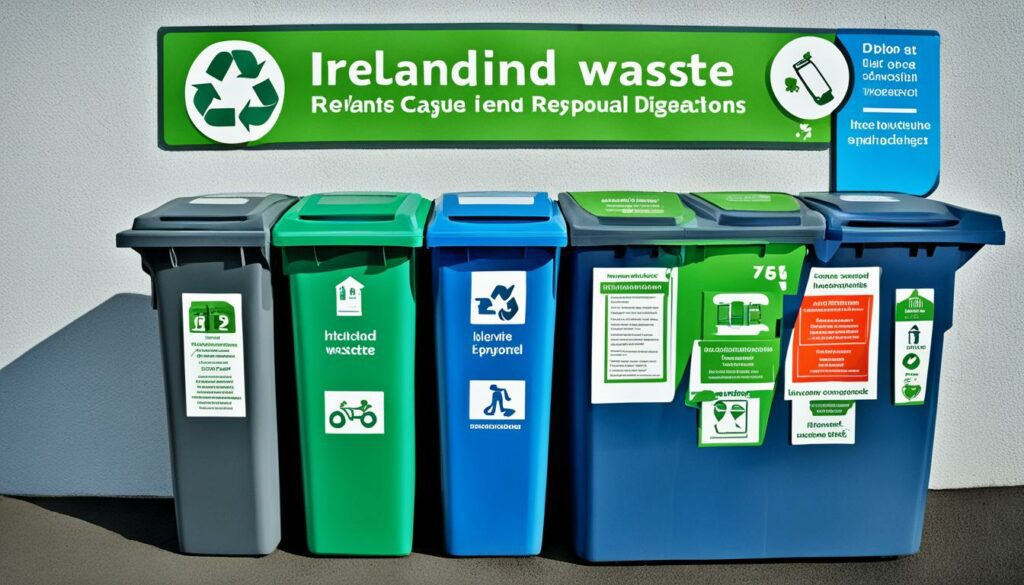
Following these tips will help you manage waste better in Ireland. This benefits the environment, allowing everyone to do their part for a cleaner Ireland.
Good campaigns help everyone in Ireland get better at recycling. The country cares a lot about saving the planet. So, everyone is learning about the new rules for managing rubbish.
Irish people are learning a lot from different projects. Things like yearly waste reports and checking the plans often show how serious they are. They make sure everyone knows what they need to do, step by step.
In the future, Ireland wants to teach even more about keeping the environment clean. The EPA will lead, making plans for homes and businesses. They hope to get everyone working together to be greener.
Ireland has done really well cutting down on waste to the landfill. They went from getting rid of 41% of trash in 2012 to less than 20% in 2018. This hard work all across the nation shows how well they work together.
| Year | Municipal Waste to Landfill | Target |
|---|---|---|
| 2012 | 41% | — |
| 2016 | 26% | — |
| 2018 | — | |
| 2020 | 190,000 tonnes |
The success in cutting waste shows the new plan for managing waste works. Making plans simpler has helped. Now, it’s easier to teach people to take care of the environment.
Technology is changing how we manage waste, especially with new waste laws in Ireland. It’s making a big difference.
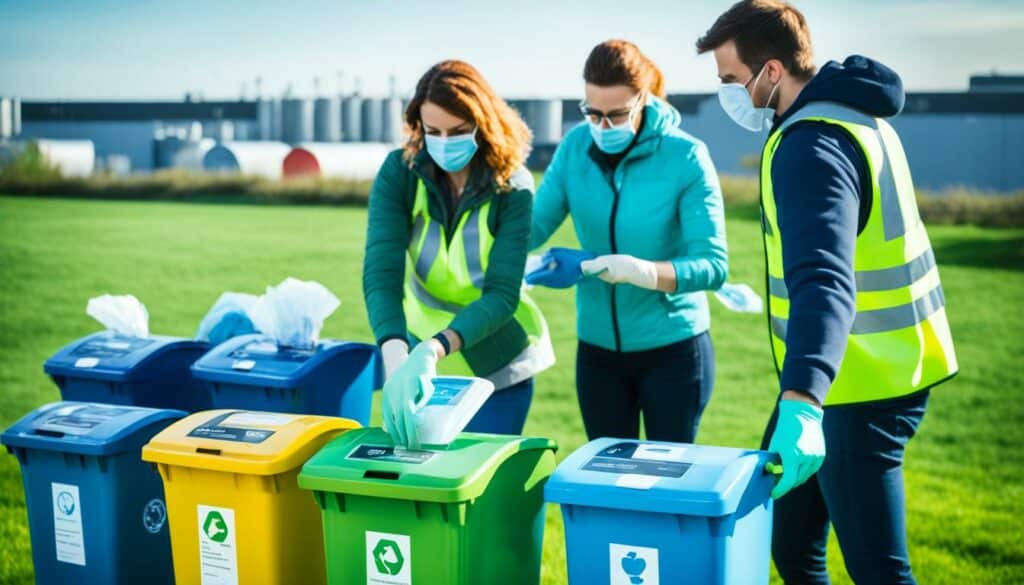
New digital tools in waste management are now being introduced. They include things like e-trading for waste. These tools, plus others like robots, IoT, AI, and data analysis, will make waste management much better.
In waste collection, using telematics and tracking your waste truck is a big step forward. It makes things smoother and follows the strict laws in Ireland.
Now, we’re moving away from paper and using digital systems. This change makes things work better. Plus, we’re using things like pay-for-what-you-use waste systems. They help the environment by encouraging people to produce less waste.
| Technology | Application | Impact |
|---|---|---|
| Robotics | Sorting waste materials | Better sorting, faster processing |
| AI Image Processing | Identifying waste | Sorts items better, collects data easier |
| Telematics | Planning logistics | Shorter routes, less fuel used |
| IoT | Monitoring in real-time | Better insights, maintenence as needed |
Robotic sorters play a key role in making recycling laws in Ireland work better. They provide detailed info on what’s been sorted. This helps improve other parts of the recycling process.
Ireland takes its waste management seriously. It follows strict laws to be green and meet EU targets. By 2018, it succeeded in important waste goals, including those for packaging and landfill waste.
The hazardous waste regulations in Ireland are clear, set by the Environmental Protection Agency (EPA). The EPA makes rules to handle hazardous waste safely. They also guide on the best ways to manage all waste to protect our environment.
Local councils have a big task too. They look after who collects business waste, manage waste leaving the country, and make sure waste is gotten rid of correctly. Their work helps keep Ireland clean and safe.
From September 1, a €10 charge on black bin waste aims to cut down on burning waste. This tax on black bin waste will encourage more recycling. Also, homes now pay for their waste by how much it weighs, encouraging less waste creation.
If people or businesses don’t follow the law, they might face big fines. Ireland’s rules are tough to protect the environment. They want everyone to join in making Ireland cleaner and better.
| Directive | Year | Key Objective |
|---|---|---|
| Packaging and Packaging Waste Directive | 1994/62/EC | Reduce packaging waste |
| Landfill Directive | 1999/31/EC | Reduce landfilling of waste |
| WEEE Directive | 2002/96/EC | Manage electrical and electronic waste |
| Waste Framework Directive | 2008/98/EC | Set waste management principles |
| End-of-Life Vehicles Directive | 2000/53/EC | Ensure proper disposal of vehicles |
| WEEE Directive Recast | 2012/19/EU | Update WEEE guidelines |
| Batteries and Accumulators Directive | 2006/66/EC | Manage battery waste |
Ensuring compliance with waste management rules Ireland is made possible by strong support. Both the government and private sectors offer resources. These help people and companies smoothly move to the new rules.
The Irish government provides numerous schemes to help with compliance with waste management rules Ireland. There are financial rewards, grants, and kits to support eco-friendly waste solutions. The aim is to make sure everyone understands and takes part through big awareness campaigns.
Private companies also chip in with fresh ideas to support the cause. They offer services like special waste sorting, top-notch recycling tech, and teaching in workshops. These ideas are designed to meet the particular needs of different groups.
Together, these efforts form a strong plan for meeting compliance with waste management rules Ireland. No one is forgotten when it comes to choosing greener methods.
Looking back at Ireland’s waste management story, it’s clear we face a big challenge. The focus on green policies began with the Waste Management Act of 1996. Over the years, key steps, like the ‘Changing Our Ways’ paper of 1998, have pushed us forward. Now, with laws such as the Circular Economy Act of 2022, we’re really stepping up our game.
By 2030, Ireland aims to reduce landfill waste to just 10%. To encourage this, a €10 fee per tonne will be placed on Black Bins from September 1. Also, there will be Pay-By-Weight Schemes to cut down on waste. The Environmental Protection Agency (EPA) is helping by promoting recycling ideas. These steps are crucial for making our planet cleaner and less polluted.
Challenges are part of adopting new rules. Yet, the tough fines for illegal dumping and ignoring waste laws make it clear. Ireland takes its waste responsibilities very seriously. By all of us working together and with support from the EPA, our country is moving towards a greener future. These efforts show Ireland’s leadership in the global push for better waste use. They promise a future where we all care more about our planet.
Ireland has introduced new rules on how we manage waste. It targets paying for waste collection, especially for businesses. This aims to make us greener and follow environmental laws better.
The goal is to make us all better at separating our waste. This way, we’ll throw away less recycling and food waste in the wrong bins.
Businesses must now sort their waste more carefully. They have to collect food waste separately to keep up with the new rules.
By the end of 2023, all homes must have a bin for food waste. This is in line with EU law. The aim is to make it easier to recycle and reduce waste.
If we don’t follow the new rules, we might pay more money to throw away rubbish. Both homes and businesses should follow the rules closely to avoid fines.
Numbers show we’re throwing away too much that could be recycled or composted. Over a third of food waste in businesses isn’t properly sorted. Also, home waste shows we’re not using our food waste bins enough.
Being better at waste management means we use less landfills and cut down on pollution. It also helps us live in a cleaner world, fitting our sustainability goals.
The EPA plays a big role. It sets rules, checks if we’re following them, and aims for high waste disposal standards. They help push us towards more circular use of resources.
The waste sector finds it hard to start new services and some people don’t like the new rules. To fix this, we need to be creative and work together.
There are stories of how people, including businesses, are doing well with the new rules. These show that the new waste ways can work for everyone.
They should learn from guides and tools in the new rules. This helps make sure waste is separated correctly, making the job easier and efficient.
Efforts are in place to teach everyone how to recycle better. There are upcoming plans to do more, trying harder to get everyone on board.
The waste world is using new tech for better sorting, collecting data, and making it easier to recycle. This makes our waste system smarter and more efficient.
The government and new private services offer help and ways to make the change smoother. They provide tools and even money to help with the new waste rules.